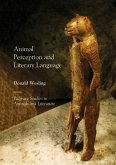"Jonsson is the first scholar in this historical field to assimilate the most recent empirical knowledge about our evolved human nature and the psychology of imagination. Her theoretical framework provides robust explanatory power, her interpretive critiques are incisive and authoritative, and her style is lucid and vigorous. Like the best critics of any literary school, she evokes the whole imaginative world view of the authors she discusses."
--Joseph Carroll, Curator's Distinguished Professor Emeritus, University of St. Louis, Missouri, USA
"Jonsson's new book is brilliantly conceived, elegantly written, and deeply illuminating. Her premise is that Darwinian thinking represented a profound challenge to the foundational concepts of literary culture-the autonomy of the individual, the meaningfulness of human life, the importance of moral choice, and the value of art. Her argument is that literary culture in the years following Darwin explored ways of confronting this challenge, opening up a space between difficult truths and soothing fictions, and making it possible for people to grasp the unique disturbance of the Darwinian message without being destroyed by its implications."
--Geoffrey Harpham, senior fellow at the Kenan Institute for Ethics, Duke University, USA
Darwinian evolution is an imaginative problem that has been passed down to us unsolved. It is our most powerful explanation of humanity's place in nature, but it is also more cognitively demanding and less emotionally satisfying than any myth. From the publication of the Origin of Species in 1859, evolution has pushed our capacity for storytelling into overdrive, sparking fairy tales, adventure stories, political allegories, utopias, dystopias, social realist novels, and existential meditations. Though this influence on literature has been widely studied, it has not been explainedpsychologically. This book argues for the adaptive function of storytelling, integrates traditional humanist scholarship with current knowledge about the evolved and adapted human mind, and calls for literary scholars to reframe their interpretation of the first authors who responded to Darwin.
Dieser Download kann aus rechtlichen Gründen nur mit Rechnungsadresse in A, B, BG, CY, CZ, D, DK, EW, E, FIN, F, GR, HR, H, IRL, I, LT, L, LR, M, NL, PL, P, R, S, SLO, SK ausgeliefert werden.









